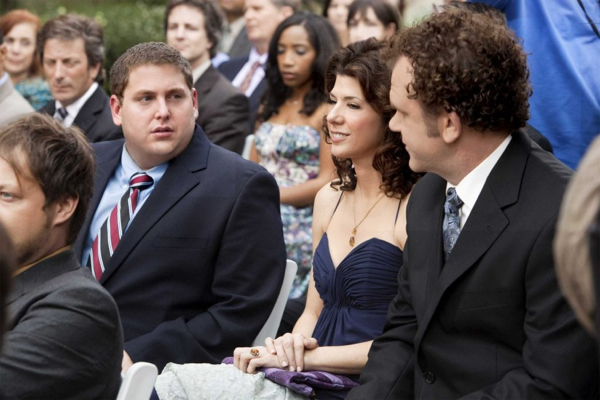Movie review by Greg Carlson
Mumblecore veterans Jay and Mark Duplass reach their widest audience to date in “Cyrus,” a queasy treatise on desperation and codependence misleadingly marketed as a goofball comedy. The movie is most certainly funny, but the laughter is tempered by the seriousness with which the writer-director siblings approach the core triangle of misfits, an awkward grouping that places a smart, beautiful woman between her genuine, earnest new suitor and her coddled adult son. “Cyrus” raises more questions about commitment, gender, parenting, and the postponement of emotional maturity than it answers, an apparently deliberate strategy which intrigues and baffles in equal measure.
Jonah Hill’s title character, a needy manchild still knotted to mother Molly’s (Marisa Tomei) apron strings, is but a whisper from Norman Bates. Cyrus’ headlining status clues the audience to his pivotal importance, even though we do not meet him until Molly has forged a sudden bond to John (John C. Reilly), a lovesick, forlorn washout still reeling from a divorce that was finalized years ago. Cute-meeting while John relieves himself in the bushes at a party, knockout Molly inexplicably pursues the self-described Shrek lookalike, initiating the first of the Duplass brothers’ movieland fantasias.
After a few dates and no invitation to see where Molly lives, John stalks his new girlfriend home and comes face to face with the unfailingly polite Cyrus, whose off-kilter demeanor hints at the deep dysfunction that will define the remainder of the story. As the first encounter between the two future rivals unfolds, Reilly and Hill unleash a lacerating duet of barely hidden masculine posturing, and the sequence in which Cyrus demonstrates his life’s work – spaced-out, beat-driven, electronic instrumentals created on synthesizers and a laptop – is a tiny masterpiece. John: “Sounds like Steve Miller. You know, that one Steve Miller song.” Cyrus: “No it doesn’t.”
The Duplasses are not the first filmmakers to embrace a loose, improvisational technique as they craft projects from the interplay of the characters on the page and the ways in which their performers realize and bring those people to life. All three of the principals make smart, canny choices, but the figures they represent have a way of blocking access to the parts of themselves that would really allow “Cyrus” to soar. At one point, when he can take no more of Cyrus’ lies and manipulations, John admonishes Molly to open her eyes, and the frustration he expresses is equally palpable for the audience, particularly because it is so difficult to see why an otherwise stable person enables the worst tendencies of her offspring.
In so many mumblecore movies, the line between pain and humor is fine, and “Cyrus” shares this trait with its lower-budgeted kin. The filmmakers and performers wholeheartedly embrace the conceit that Molly and Cyrus share a virtually incestuous relationship, but other than a few vague references to mistakes and failings in the manner Cyrus was raised by Molly, the viewer – along with John – must guess at the reasons for such overt oedipal adhesion. We know that a boy’s best friend is his mother, but the filmmakers Duplass firmly resist providing specifics.
